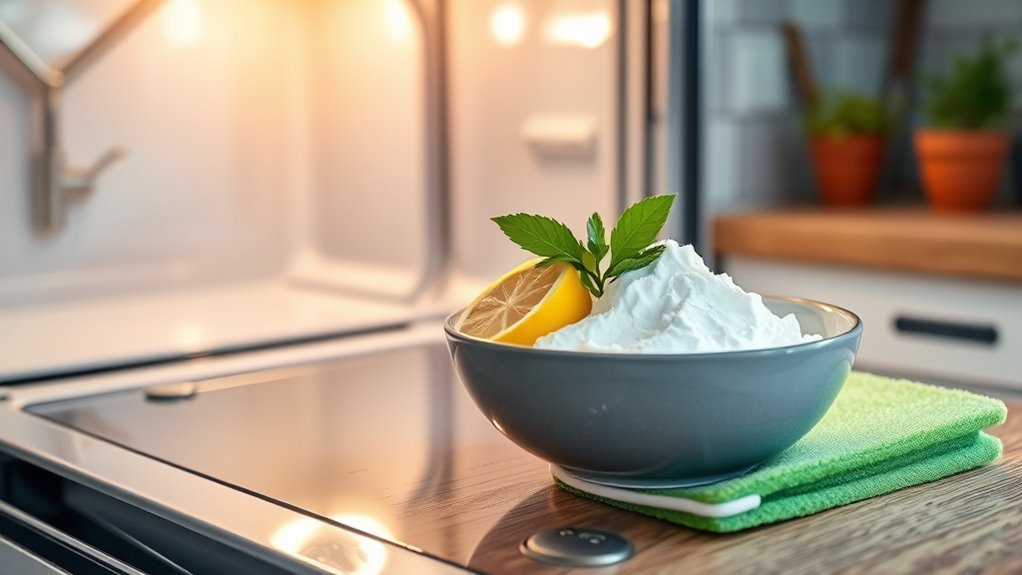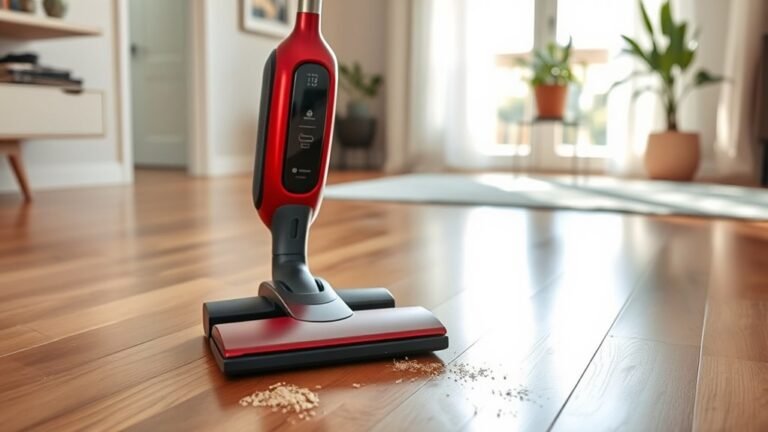Natural Cleaning Hacks for Your Oven
You can easily clean your oven using natural ingredients like a baking soda paste to tackle grease and vinegar as a powerful degreaser. Try steaming water with essential oils like lemon or eucalyptus inside your oven for softened grime and a fresh scent. Don’t forget to soak racks in hot soapy water and scrub with crumpled foil to remove stubborn spots. These safe, eco-friendly methods protect your oven and health—there’s plenty more helpful tips to discover for maintaining a spotless oven naturally.
Benefits of Using Natural Oven Cleaners
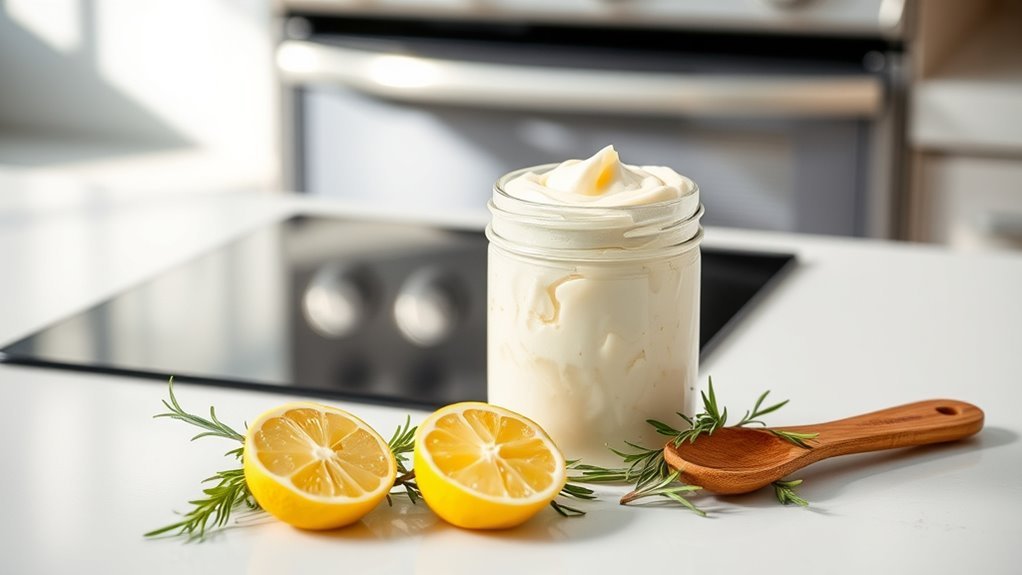
Although commercial oven cleaners can be effective, using natural oven cleaners offers several benefits that make them worth considering. You’ll appreciate eco friendly alternatives because they’re safer for your health and the environment, avoiding harsh chemicals that can irritate your skin or lungs. Chemical free solutions reduce your exposure to toxic fumes, providing peace of mind while you clean. Plus, natural cleaners often use simple ingredients you likely have at home, giving you more freedom from expensive, specialized products. These options tend to be gentler on your oven’s surfaces, helping preserve its lifespan. By choosing natural methods, you take control of your cleaning routine, making it both safer and more sustainable without sacrificing effectiveness. It’s a smart step toward a cleaner, greener home. Regular deep cleaning every 3-6 months with natural cleaning methods helps maintain oven efficiency and freshness.
How to Prepare a Baking Soda Paste for Oven Cleaning
When you’re ready to tackle oven grime naturally, preparing a baking soda paste is a simple and effective first step. Start by mixing about half a cup of baking soda with a few tablespoons of water. Add the water gradually, stirring until you get a spreadable cleaning paste—not too runny, but smooth enough to coat surfaces evenly. This paste works wonders on baked-on grease and food residues. Apply it generously to your oven’s interior, focusing on stubborn spots. Let it sit for several hours or overnight to break down grime. The beauty of this baking soda cleaning paste is its gentle yet powerful action, letting you clean without harsh chemicals. Once ready, you’ll find scrubbing easier, freeing your oven from buildup naturally and safely. Remember to avoid applying the paste on heating elements to protect your oven’s components and ensure safety during cleaning safe application.
Using Vinegar as a Natural Degreaser
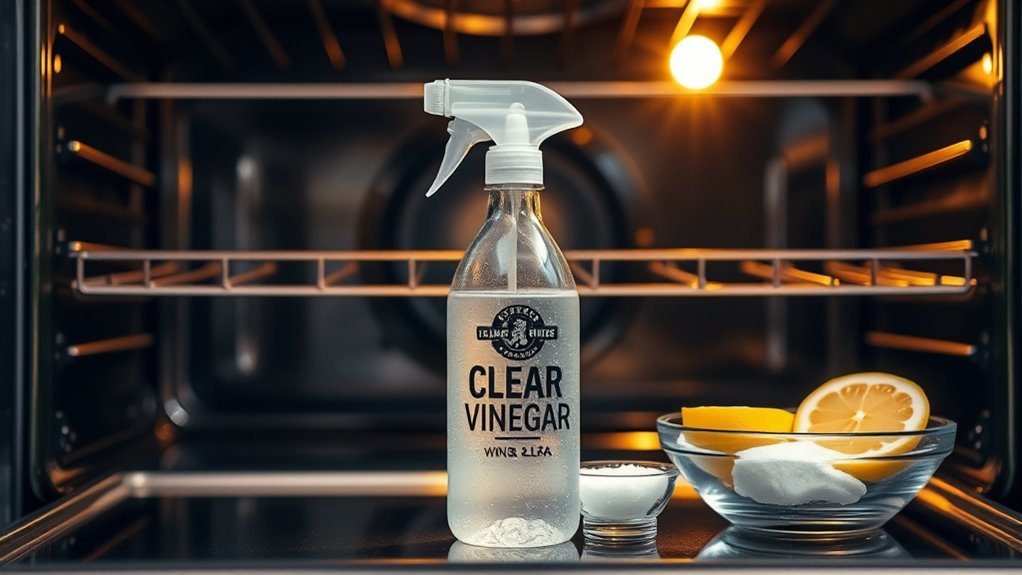
You can tackle stubborn grease in your oven by using vinegar, a natural degreaser that breaks down grime without harsh chemicals. Simply spray it directly on greasy spots and let it sit for a few minutes before wiping clean. This method not only cuts through grease effectively but also leaves your oven fresh without the strong odors of conventional cleaners. Be sure to rinse thoroughly after application to ensure effectiveness and safety.
Vinegar’s Grease-Fighting Power
Because vinegar is acidic, it cuts through stubborn grease and grime in your oven without harsh chemicals. This makes vinegar one of the most effective natural cleaning agents you can depend on. Among vinegar benefits, its ability to break down oily residues stands out, making your oven cleaning simpler and safer. Vinegar applications go beyond just cleaning; its grease-fighting power guarantees even baked-on messes become manageable. When you use vinegar, you’ll notice how it loosens grime, allowing you to wipe away buildup with ease. This means you’re not just masking dirt—you’re genuinely removing it. Embracing vinegar’s grease-fighting power means less scrubbing, fewer toxic fumes, and a cleaner oven that’s ready for your next cooking adventure.
How to Apply Vinegar
Vinegar’s grease-fighting power works best when applied correctly, so knowing how to use it as a natural degreaser can make your cleaning more effective. Start by mixing equal parts white vinegar and water in a spray bottle—this simple vinegar mixture is versatile for most oven cleaning tasks. Spray the solution generously over greasy surfaces, focusing on stubborn spots. Let it sit for 10-15 minutes to break down the grime. For tougher buildup, you can increase the vinegar concentration or add a few drops of dish soap to enhance grease-cutting power. After soaking, scrub with a non-abrasive sponge or cloth, then wipe clean with a damp towel. These vinegar applications save you from harsh chemicals while giving your oven a fresh, natural clean without much effort.
Benefits Over Chemical Cleaners
Although chemical cleaners might promise quick results, using vinegar as a natural degreaser offers several clear advantages that you’ll appreciate. Vinegar stands out as one of the best eco friendly alternatives for your oven cleaning needs. Here’s why you might want to switch:
- Reduces chemical exposure, making your kitchen safer for you and your family.
- Eco friendly alternatives like vinegar break down grease effectively without harsh toxins.
- It’s cost-effective—you probably already have it at home, saving you money.
- Vinegar’s natural acidity helps prevent damage to your oven’s surfaces, unlike some aggressive chemical cleaners.
Lemon Juice for Removing Oven Odors and Stains
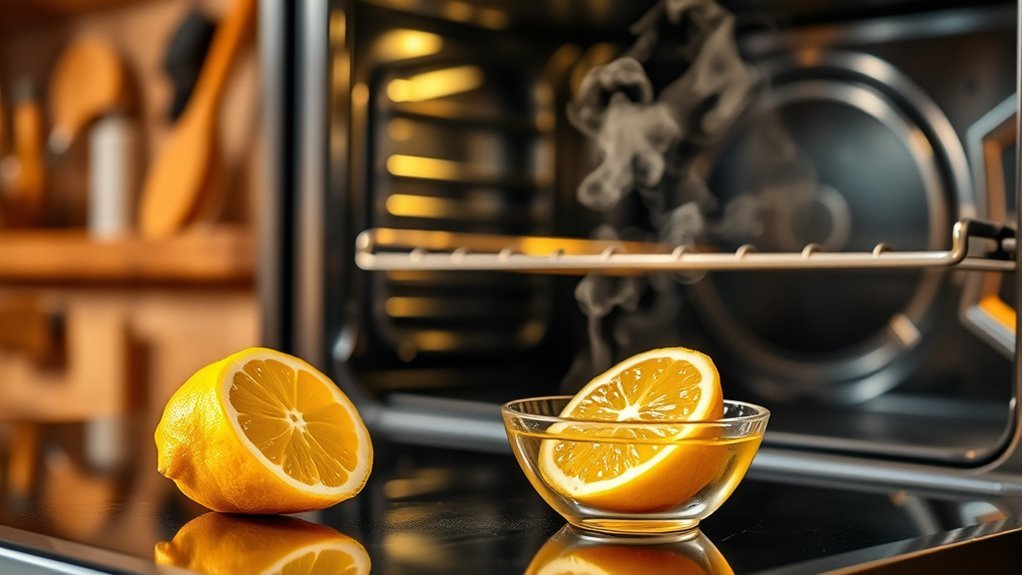
When you want to freshen up your oven without harsh chemicals, lemon juice is a natural solution that works wonders. Thanks to lemon benefits like natural acidity and antibacterial properties, it tackles stubborn stains and odor elimination effectively. Simply cut a lemon in half, squeeze the juice onto the oven surfaces, and rub gently. The fresh citrus scent will replace any lingering odors, making your oven smell clean and inviting.
| Task | What You Need | How It Helps |
|---|---|---|
| Stain Removal | Lemon juice | Breaks down grease & grime |
| Odor Elimination | Lemon halves | Neutralizes bad smells |
| Fresh Scent | Lemon peel | Leaves a pleasant aroma |
Using lemon juice gives you a simple, eco-friendly way to keep your oven spotless and fresh. For best results and to protect your oven’s finish, avoid abrasive tools and harsh chemicals when cleaning, as recommended in cleaning precautions.
Steam Cleaning Your Oven With Water and Essential Oils
You can freshen up your oven effortlessly by steam cleaning with just water and a few drops of essential oils like eucalyptus or lemon for added freshness. This method loosens grime without harsh chemicals, making cleanup quicker and safer. Follow a simple step-by-step process to fill a dish with water and oils, heat it in the oven, then wipe away the softened residue for a spotless finish. This approach aligns well with using non-toxic cleaners to ensure a safe cooking environment.
Benefits of Steam Cleaning
Since harsh chemicals can leave behind residues or unpleasant odors, steam cleaning your oven with just water and essential oils offers a gentle yet effective alternative. You’ll enjoy:
- Non-toxic cleaning – Steam cleaning avoids harsh chemicals, promoting better indoor air quality and reducing health risks.
- Deep grease removal – The high-temperature steam loosens baked-on grime, making it easier to wipe away without scrubbing.
- Time-saving – Steam softens stubborn stains quickly, cutting down your cleaning time considerably.
- Eco-friendly – Using just water and essential oils means less plastic waste and no harmful runoff, aligning with your desire for a cleaner, greener home.
This method not only cleans thoroughly but also supports your health by minimizing exposure to irritants, helping you maintain a fresh, safe kitchen environment effortlessly.
Essential Oils Selection
Although water alone can loosen grime during steam cleaning, adding essential oils boosts both cleaning power and aroma. You’ll find that essential oils not only enhance the steam’s ability to break down grease but also leave a new scent behind, making your oven smell inviting. Choosing the right essential oils guarantees you maximize these cleaning benefits without overpowering your space.
| Essential Oil | Cleaning Benefits |
|---|---|
| Lemon | Cuts grease, leaves a fresh citrus scent |
| Tea Tree | Natural antimicrobial, deodorizes |
| Eucalyptus | Breaks down grime, invigorating aroma |
| Lavender | Gentle antiseptic, calming fragrance |
Pick oils based on your preference, and enjoy the freedom of a naturally clean oven with minimal effort.
Step-by-Step Cleaning Guide
Cleaning your oven with steam and essential oils involves just a few simple steps that make the process both effective and enjoyable. This method uses natural cleaning materials, keeping things safe and fresh. Here’s how to do it:
- Pour a cup of water into an oven-safe dish and add 10-15 drops of your chosen essential oil.
- Place the dish on the middle rack of the cold oven.
- Turn the oven on to 250°F (120°C) and let it steam for 30 minutes.
- Once cooled, open the door and wipe down the interior with a damp cloth, removing loosened grime effortlessly.
These oven cleaning techniques free you from harsh chemicals and make upkeep simple and invigorating.
Cleaning Oven Racks Using Dish Soap and Aluminum Foil
Anyone who’s dealt with greasy oven racks knows how tough it can be to get them spotless. Here’s a simple way to tackle that using dish soap and aluminum foil. First, remove your oven racks and place them in a bathtub or large basin. Fill it with hot water and add a generous squirt of dish soap. Let the racks soak for at least an hour to loosen grime. After soaking, crumple a piece of aluminum foil into a ball—this will act like a gentle scrubber. Use the foil ball to scrub the racks, focusing on stubborn spots. The combination of dish soap and the scrubbing action of foil makes cleaning easier without harsh chemicals. Rinse well, dry, and your racks will be ready to slide back in. Soaking the racks separately helps to protect their finish and saves scrubbing time, ensuring a more effective clean Oven Racks.
Tips for Maintaining a Clean Oven Naturally
Once your oven racks are sparkling clean, keeping the entire oven fresh becomes much easier. To maintain your oven naturally, follow these oven maintenance tips using natural cleaning solutions:
- Wipe spills immediately with a damp cloth to prevent buildup.
- Use a baking soda paste weekly—mix baking soda and water, apply inside the oven, let sit, then wipe clean.
- Place a small bowl of vinegar inside the oven during a warm cycle to neutralize odors.
- Regularly remove crumbs and food debris to avoid burnt residues and smoke.
- Establish consistent care habits similar to those used for routine maintenance of other appliances to prolong cleanliness and efficiency.
Safety Precautions When Using Natural Cleaning Ingredients
Although natural ingredients are generally safer than harsh chemicals, you still need to handle them with care to avoid any accidents or damage. Prioritize natural ingredient safety by wearing gloves, avoiding ingestion, and ventilating your kitchen. Remember, even common items like baking soda and vinegar can cause irritation or damage if misused. Follow these oven cleaning precautions to keep your space safe and effective. Choosing products with ingredient transparency helps ensure safer use of natural cleaners.
| Ingredient | Precaution | Reason |
|---|---|---|
| Baking Soda | Avoid eye contact | Can cause irritation |
| Vinegar | Don’t mix with bleach | Produces toxic fumes |
| Lemon Juice | Test on surfaces first | Acidic, may discolor surfaces |
| Water | Use warm, not hot water | Prevents burns |
| Essential Oils | Use sparingly | Can cause allergic reactions |
Stay safe and enjoy your natural oven cleaning journey!
Time-Saving Natural Cleaning Hacks for Busy Schedules
Keeping safety in mind makes your natural cleaning efforts more effective and stress-free. When your schedule’s tight, smart time management and quick solutions are key. Here are four time-saving natural cleaning hacks for your oven:
- Use a baking soda paste: Apply it and let it sit overnight, so you clean while you sleep.
- Vinegar spray: Quickly break down grime—just spray and wipe after a few minutes.
- Steam clean with lemon: Heat water with lemon slices in the oven for 20 minutes; the steam loosens dirt effortlessly.
- Clean oven racks in the dishwasher: Remove racks and let your dishwasher do the heavy lifting.
These hacks free up your time while keeping your oven fresh and safe to use. Incorporating natural solutions like baking soda and vinegar minimizes reliance on harsh chemicals for a healthier home.
Frequently Asked Questions
Can Natural Cleaners Damage Oven Seals or Heating Elements?
You might think using natural cleaners will instantly wreck your oven seals or heating elements, but that’s just not the case! When you follow proper oven maintenance and cleaning safety guidelines, natural solutions like vinegar or baking soda won’t harm those parts. Just avoid soaking seals or spraying directly on heating elements. Keeping your oven clean with gentle, natural products gives you freedom from harsh chemicals while protecting your appliance’s longevity.
How Often Should I Deep Clean My Oven Naturally?
You should aim for an oven cleaning frequency of about every 3 to 6 months to keep things fresh without overdoing it. Setting a natural cleaning schedule based on how often you cook can help—if you use your oven a lot, clean it closer to every 3 months. For lighter use, every 6 months works fine. This approach keeps your oven efficient and odor-free, giving you the freedom to cook without worrying about buildup.
Are Natural Cleaning Methods Effective on Commercial Ovens?
You’ll find natural cleaning methods can work on commercial ovens, but they might take more effort compared to residential ones. For effective oven maintenance, you’ll want to choose natural cleaning products strong enough to tackle heavy grease and baked-on grime. Keep in mind, regular upkeep helps prevent buildup, making natural solutions more effective. So, while natural methods can do the job, you might need to combine them with occasional professional cleaning for best results.
Can Natural Oven Cleaners Remove Burnt-On Cheese?
You know what they say, “Rome wasn’t built in a day.” When it comes to burnt residue like cheese, natural cleaning solutions can help, but they might need some patience. You’ll want to make a paste from baking soda and water, apply it to the burnt spots, then let it sit for a few hours before scrubbing gently. It’s a practical method that frees you from harsh chemicals while effectively tackling tough messes.
What Natural Cleaner Is Best for Self-Cleaning Ovens?
For self-cleaning ovens, you’ll want a gentle yet effective natural cleaner. Baking soda is your best bet—it’s great at breaking down grime without harsh chemicals. Make a paste with water, spread it inside, and let it sit. Then, spritz a vinegar solution over the baking soda; it’ll fizz and help lift stubborn spots. After a while, just wipe it clean. This combo keeps your oven fresh while giving you freedom from toxins.
